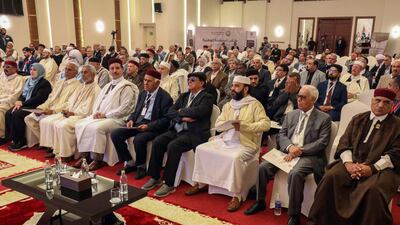The UN has presented a proposal aimed at resolving Libya's political deadlock and advancing towards national elections, the bloc's envoy to the country said on Monday.
The plan, described as an inclusive, intra-Libyan initiative, seeks to end the status quo and renew the legitimacy of the country’s institutions.
“I intend to facilitate this process through an incremental, flexible approach to enable progressive building of consensus,” acting UN envoy to Libya Stephanie Koury told the Security Council. “This incremental approach is also designed in such a way as to not predetermine any decisions made by the next special representative and can be adjusted as appropriate.”
Libya continues to struggle with recovery from years of conflict after the 2011 Nato-backed uprising that removed long-time ruler Muammar Qaddafi. The country remains split between the UN-recognised government in Tripoli and a rival eastern administration aligned with military leader Field Marshal Khalifa Haftar.
Unsmil, the UN's mission to Libya, will establish an advisory committee to help resolve electoral issues and to pave the way for general elections, Ms Koury said. There has been no indication of when the elections might be held, however.
“We need a new political process in Libya, as difficult as that might seem,” said US ambassador to the UN Linda Thomas-Greenfield. “And we continue to believe the UN is the best placed international actor to lead that process.”
She said “real progress on the political future of Libya” requires leaders to make tough compromises on contentious issues.
“But here’s what we know: that kind of compromise is possible. The resolution of the central bank crisis demonstrated that. Consensus-based solutions, brought about through dialogue, are not out of reach – they are essential,” Ms Thomas-Greenfield said.
Libya's ambassador to the UN, Taher El Sonni, said that the speakers at the Security Council briefing on the situation in his country “owe an apology to the Libyan people”. “The only commonality is admitting a stalemate and lack of a clear vision or time frame while the upcoming political process remains elusive,” he said.
Mr El Sonni said the successful delivery of recent local elections showed that the issue with staging a national vote was not logistical but political. Some local and regional elections have been held, such as in Libya's third city Misurata on November 16, but no national vote has been conducted.
A UN-brokered agreement signed in Geneva after a ceasefire in Libya's civil war aimed to establish interim institutions before nationwide parliamentary and presidential elections set for December 2021. But the elections were postponed indefinitely due to disputes over the legal framework governing the vote.
“It is my priority, based on my consultations with Libyans across the country, to address contentious issues in the legal framework for the elections,” Ms Koury said. “While the existing framework is the positive outcome of Libyan efforts, and a good basis, it remains highly contentious among Libyans and it is unlikely to produce a viable and peaceful electoral event without some tweaks.
“We must be mindful of past experiences, in particular of the failed 2021 election.”
She noted that Libya has faced significant economic challenges in recent years, compounded by external interference, although she refrained from naming specific countries. “Libya has the potential to become a beacon of stability and prosperity for the Mediterranean region and beyond,” she said.
Ms Koury said the UN aims to enable dialogue to establish “a unified national vision” for the country's future.


